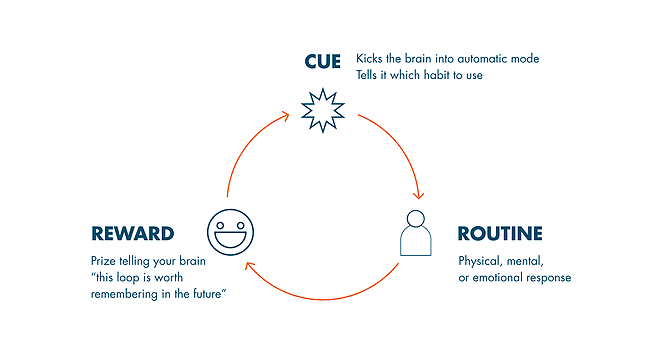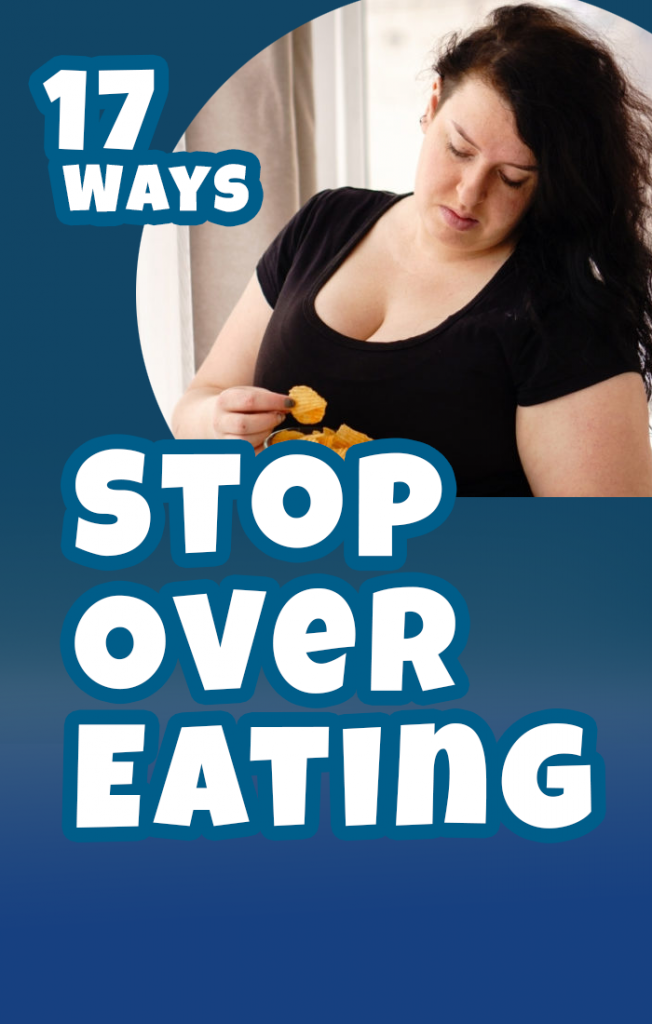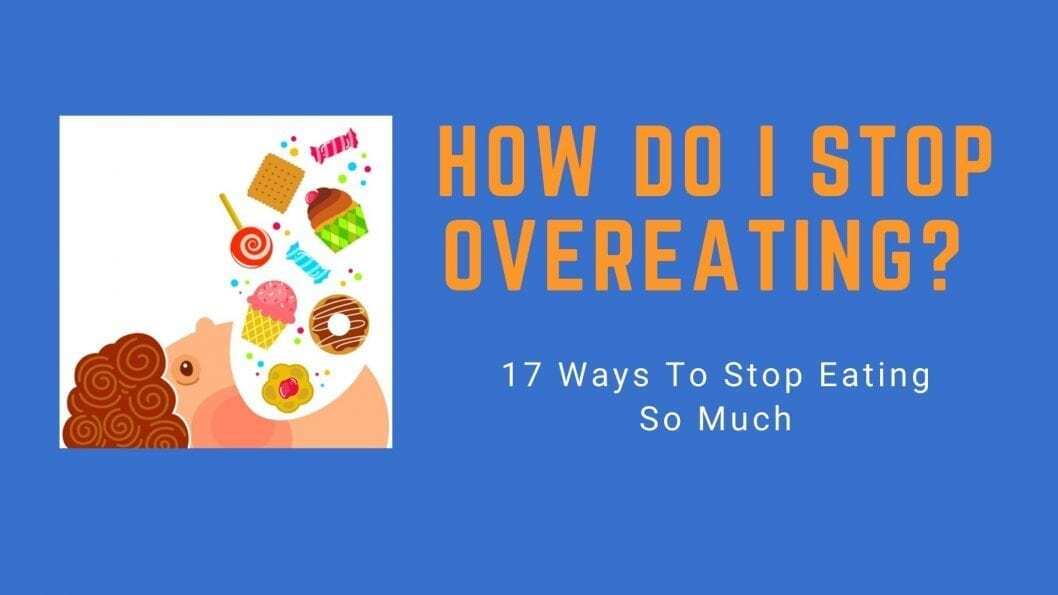Overeating is common because of today’s economy of convenience.
Foods are literally designed to be as addicting as possible!
How can you stand a chance to change what you’re eating when you’re against the entire United States food industry?
But there’s one thing the food industry can’t take away from you …
Your ability to train mind and body to enhance your appetite control!
Fortunately there are many techniques you can use to train your mind and body and ultimately stop overeating.
In this article I’ll describe 17 techniques, which can be grouped into 3 different main strategies:
Here are the 3 main strategies (with techniques):
- Eat Better (5 ways)
- Use Psychology (7 ways)
- Reduce Stress (5 ways)
Eat Better
- Eat more fiber
- Eat more regularly
- Eat more protein
- Drink less sugary drinks
- Eat more ‘good’ fats
1 – Eat More Fiber
Don’t let yourself get really hungry. This is the one of the most important pieces of advice.
To make sure you control your hunger, eat more foods that dissolve slowly.
Fiber dissolves slowly. Sugary foods dissolve fast.
Beans, vegetables, whole wheat breads, brown rice – these types of foods dissolve moe slowly and can help your stomach to feel full longer.
When you feel full longer, then you don’t want to overeat as much.
One scientific study compared high fiber breakfasts to low fiber breakfasts.
The first group ate oatmeal (high fiber) and the second group had sugary cereal (low fiber).
The high fiber group reported feeling fuller for longer and ate less at lunch.
2 – Eat More Regularly
Life is busy. It’s easy to forget a meal when you’re stressed out and have many things going on.
And there’s also weight loss. Our culture discriminates against fat people so there is a lot of social pressure to lose weight.
When you want to lose weight, you may also skip meals.
But skipping meals is not good for your health, even if you are attempting to lose weight.
Oftentimes people skip a meal, but then overeat the next meal.
And other studies have shown that eating more regularly throughout the day decreases overall food consumption.
3 – Eat More Protein
Protein also digests slowly and keeps you full for longer, just like fiber does.
Similar to eating a high fiber breakfast, studies have shown eating a high protein breakfast can decrease food intake the rest of the day.
Plus, protein helps build muscles!
Examples of protein include:
- Chicken
- Nuts
- Fish
- Eggs
- Tofu
- Yogurt
4 – Drink Less Sugary Drinks
Here’s a simple idea:
Switch out the juices and sodas for water.
We all know that studies have shown that sodas and carbs can increase weight and are linked to overeating.
For example, one study showed that people who drank sugary drinks ate close to 8% more food overall!
5 – Eat More ‘Good’ Fats
Not all fats are bad!
Sure, fat is bad if you’re only talking about fried fat found on the fries at McDonald’s.
But there are good fats as well and they are important to eat to stop overeating!
Why? Fats digest even slower than protein or fiber! This makes them the ultimate “stop overeating” food!
Here are some examples of “good” fats:
- Olive oil
- Peanut butter
- Nuts
- Seeds
- Yogurt
Use Psychology
- Decrease distractions
- Know your triggers
- Don’t ban foods
- Chew slower
- Check in with yourself
- Stop the dieting mentality
- Keep goals top of mind
6 – Decrease Distractions
Mind and body are connected.
If you’re distracted while you eat, it’s almost as if your mind didn’t realize you were eating.
Over 20 studies have found that distractions cause people to eat more food later on in the day as opposed to people who ate with no distractions.
Put down the phone for the first few bites at least!
7 – Know Your Triggers

If you study your overeating patterns you’ll be able to spot situations that frequently occur before you overeat.
Do you overeat after work right when you get home? Then make sure you eat enough fiber, protein and fat during the day.
Or do you overeat at lunch when you finally get a chance to slow down and breathe? Make sure you de-stress in the morning and get a hearty breakfast.
Or maybe you overeat at night once everything quiets down? Be sure to relax once you get home and get some quiet time in before night time.
Pay attention to the situations that happen before you overeat.
If you can spot the pattern behind your overeating, you’ll be able to identify actions to take to avoid those triggers.
8 – Don’t Ban Foods
Stop saying “I’ll never eat THAT again.”
If you overeat something, one natural response is to say you won’t eat THAT again.
But paradoxically, when you say you won’t ever eat THAT food again, your brain thinks THAT food is very scarce.
And scarcity leads to overeating because scarce foods are perceived by your brain as extra rare and valuable.
This makes your brain want to binge eat these scarce foods because those foods are perceived as valuable!
So whenever you ban foods and say you won’t eat a certain food, what you are actually doing is saying to your brain ‘that food is scarce and valuable.’
Banning foods can have the opposite effect of what they intend. Banning foods just wracks with your hunger. And you won’t be able to stop thinking about food!
If you find yourself overeating foods that you don’t allow, try the path of hunger moderation instead.
Instead of cutting out certain foods entirely, allow yourself to treat yourself to these foods in moderation.
Do not let yourself get to the point where you are desperately craving these foods!
For example, I personally allow myself to eat cookies. I know that if I allow myself to eat a few cookies then I won’t binge on them on some random occasion.
9 – Chew Slower
It takes about 20 minutes for your stomach to realize it’s eaten something!
If you wolf down your food rapidly, then you can easily overeat because your stomach hasn’t had a chance to notice that it’s full.
Here are some tips to slow down:
- Take a breath between bites
- Have water with your food
- Have a timer to see how fast you eat, this may surprise you!
- Chew more slowly
My advice would also be to start small.
For example, try chewing just 10% slower or try chewing slower for just the first minute. That alone will help with stress eating!
10 – Check In With Yourself
In today’s stressful society, it’s important to take breathers.
Think about holding your breath underwater, eventually you need to come up to breathe.
Same thing with work. You can’t just work all day. You need to take breaks to check in with yourself throughout the day.
Try taking walking meetings on your phone if you can. Or taking the stairs instead of the elevator.
11 – Stop The Dieting Mentality
Diets may lead to weight loss temporarily. However, long term weight loss studies show that most people who diet end up gaining more weight in the long run.
In addition, dieting is the biggest predictor of developing an eating disorder!
I currently work at an eating disorder clinic, and every client at the clinic comes from a background of extreme weight loss attempts.
Oftentimes people in dieting mode don’t listen to their hunger. And then they break the most important rule to stop overeating – which was to not let yourself get too hungry!
Then the person engages in binge eating because they were super hungry!
Instead of trying to learn rules, try to invest in long term skill sets like Intuitive Eating.
Be sure to make sure you judge success not just in terms of weight loss but how you feel.
12 – Keep Goals Top Of Mind
Write out your goals, your long-term vision. Put them somewhere visible where you’ll be reminded of them.
When you can readily recall your “why” (that is, your goals and affirmations) when you are in the midst of stress, you’ll be more easily able to stay balanced and calm.
Plus, knowing your long-term vision can help with food cravings too.
In many ways, binge eating disorder is simply forgetting your “why”.
Don’t get me wrong, if you are allowing yourself to get too hungry, you will end up binge eating no matter how strong your motivation is.
But in many ways, after you are eating properly, binge eating disorder is about emotional intelligence.
That’s why when talking about how to stop binge eating, you address both nutrition and psychology!
Because in many situations binge eaters are just missing some nutrition or not addressing some psychological factor.
And if you’re missing the psychology part, then an important piece of the psychology part is keeping your goals in mind!
Reduce Stress
- Journal
- Plan ahead
- Friends
- Move Your Body
- Sleep
13 – Journal
Keeping a journal is an invaluable tool, but only if you genuinely like journaling.
Many clients I work with report previously being forced to write a food journal.
As a result, now they have resistance to food journaling, and they associate their food journal experiences to mean that all journaling is miserable!
However, there are many types of journaling.
- Write down your feelings
- Think about your future goals
- Plan out your day
- Write down what you are grateful for
- Identify triggers
So if you journal, just be sure you like it too. Ultimately, if you are caught in bingeing then you need to study your psychology so you can intimately learn about your emotional needs and mind body connection.
A journal can help you do just that!
14 – Plan ahead
The reason we eat more fat, protein and fiber is to prevent our hunger from getting too hungry.
However, if you have a sudden meeting or errands, you can easily go without food for hours and experience too much hunger.
Too much hunger caused by gaps in your schedule will only lead you to overeat. You must control for these periods where you’ll skip meals by planning ahead.
When you know your schedule because you have planned ahead, you can bring snacks with you, or eat even when you are not super hungry to prepare yourself for the time when you won’t have food.
You can also keep snack options nearby, like having a bag of nuts in your car or purse. You can also keep the fridge stocked with healthy options.
If you don’t plan ahead and eat regularly, then chances are you’ll end up overeating at night!
15 – Friends
There’s a quote that goes, “You are what you eat.”
There’s some truth to that, but a better quote is “You are who you surround yourself with.”
It can be truly difficult to change your eating habits if your friends are not helping.
Many people are not aware of how their friend’s and family’s food choices impact their own personal food choices.
This is perhaps the most difficult of all these techniques to implement. After all, your friends are people, not objects under your control simply to use your ‘stop overeating techniques’ upon!
But there are elements regarding your friends that you do have some control over.
For example, see if you can make health something you do with your friends!
Hiking is a great place to start. Perhaps after hiking your friend becomes open to some of your ideas about eating more fat, protein or fiber.
You can also talk about your fears of weight gain, blood sugar, or binge eating.
While these are vulnerable topics, you can also bond with your friends over these topics too.
16 – Move Your Body
We all know exercise is important for health – but what if you don’t want to or lack motivation to exercise and only want to eat ice cream?
Sometimes people find themselves stuck – they want to stop binge eating but don’t have the energy to take care of themselves.
In these situations walking is a great idea because it’s easy.
Walking feels good. It’s relaxing. And it counts for exercise!
Plus, while walking you can practice mindful walking to further decrease your stress.
Overall, you just need to find something easy and fun to move your body. Giving yourself a break from stress does a bunch of food things like:
- decrease overall food intake
- increase appetite control
- increase productivity
You could also do yoga, gardening, hiking, or running.
But a little bit of movement can really help boost your mood and decrease stress, which in turn decreases overeating.
17 – Sleep
If you are getting less than 5 hours of sleep per night, make this your top number one priority.
For me, I struggled with sleep the majority of my life.
It’s really only been the last 6 months or so that I’ve turned the corner.
And it’s made such a difference in my eating habits. I find that when I get sleep my life feels so much under control.
Here’s what I suggest:
- Turn the phone on silent so you don’t get awakened during the night
- Get ear plugs
- Get an eye patch
- Use a sleep tracking device
There are numerous studies showing the link between less sleep and obesity.
If you want to truly stop overeating, it requires a good night’s sleep.
How Do I Stop Overeating Conclusion:
Start with the low hanging fruit!
There’s some item in the above lists that seems easy to you.
Start there. Make sure it feels good to you. Make sure that it’s something you can sustain for the rest of your life. If you make a mistake, make sure you handle your mistakes without guilt.
It really has to make you feel good if you’re going to stick with it, so don’t settle until you’ve found something that feels good.
Then, after you have had some success in reducing your overeating, you’ll be ready to try another technique.
Refer to this article for ideas 🙂



